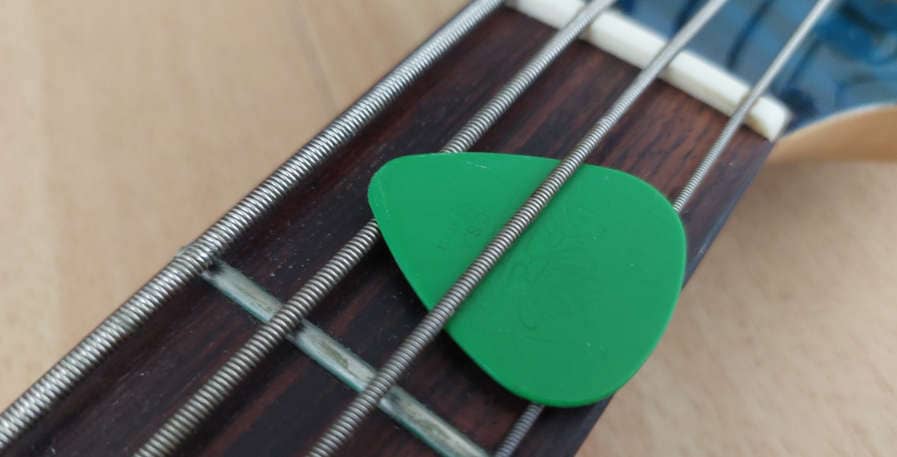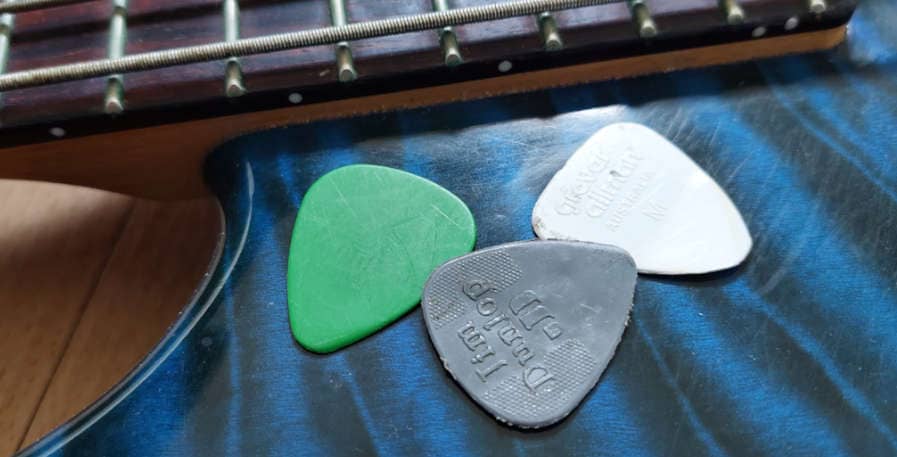Given that bass picks come in all shapes and sizes, it can be hard to know what type to choose. How you hold a bass pick, as well as the size and material of it, all make a difference. However, the most important factor is always going to be the bass pick`s thickness.
How thick a bass pick is has a major impact on the overall tone of your instrument. The thickness of it also makes a huge difference in how your bass guitar feels to play.
That`s why I`ve written this guide to show what difference the thickness of a bass picks actually makes. I`ll do this by going over thin, medium and heavy gauge picks and pointing out their strengths and weaknesses. This way, you will be able to choose a pick that is best suited for your physiology, playstyle, and taste.
Thin picks for the bass
Bass picks are often thought of as the thick counterparts to guitar picks. However, many bassists actually opt to use thin picks. It`s even a common practice for bass players to use guitar picks, despite the difference in picks intended for the bass and the guitar.
For bass, I consider anything thinner than 0.90mm to be a thin pick. This is because picks in this range have similar characteristics which start to become less prominent at 1mm.
Here is what is noteworthy about thin bass picks, and how they will affect the tone and playability of your bass:
- String resistance – Given that bass strings are thick, thin picks will bend slightly from their resistance. This is especially noticeable on the low E and A strings. In my experience, this has not mattered when playing fast lines. It has however made picking slightly awkward on slower songs where I want to focus more on the dynamics of my playing. This is because I have to slightly dig into the string with the pick, which gives me less control over how I want to pluck it.
- Plucking style – Thin picks are generally best suited for plucking strings hard and aggressively. This is because they allow you to pick strings hard without sounding excessively loud. The lightness of the pick also makes it slightly easier to pluck strings fast.
- Tone and volume – Plucking strings with a thin bass pick results in an even and balanced tone. Regardless of whether you pick strings hard or soft, your volume will stay relatively even and your tone won`t change drastically. Thus, they give you less dynamic control. In return, a thin pick ensures that your tone and volume always stay even.
- Top-heavy sound – Thin bass picks make for a tone that is low in bass frequencies, but high in treble. The lack of low-end can make your tone sound somewhat hollow when it is combined with scooped low-end EQ. The added treble will however make it easier to cut through the guitars in a mix and provide for a sharper tone.
Thus, thin picks are common for bassists in genres with fast and aggressive basslines. As for musky and smooth grooves, thin picks can be somewhat of an awkward choice.
Because of this, thin picks are used by many rock bassists. Among others, Guns N`Roses` bassists Duff McKagan uses a .73mm guitar pick to play the bass.
The trebly and sharp tone of thin bass picks also makes for a fitting punk bass tone. Thin picks are therefore a mainstay in the punk genre, and Mark Hoppus of Blink-182 and Fat Mike of NOFX, both play with a .60mm pick.

Are medium picks good for playing the bass?
Medium bass picks are all about balance. They won`t have as drastic of an impact on the playability and tone of your bass as thin or heavy picks.
I consider these bass picks to be approximately in the .090mm to 1.40mm range. Heavy picks can be as thick as 3mm, and their characteristics start to become noticeable at around the 1.5mm mark. Thus, this is a range where your bass pick won`t feel too thick, or too thin.
Here`s what you can expect from choosing a medium pick to play the bass:
- Dynamics – Medium picks won`t have as even of a tone as thin picks. However, you can still use them to play aggressively without losing total control over your volume. It is also easier to play with more feel on slower songs. Medium picks are thus a good choice if you want to play both fast and slow, or play a multitude of different genres.
- String resistance – 0.90mm picks might bend ever so slightly against thick bass strings. At 1.14mm it will happen to such a small degree that it is not noticeable anymore. Thus, a medium pick is a good choice if you don`t want it to bend against your bass strings.
- Balanced sound – Medium picks provide for a more balanced tone than their thin and heavy counterparts. Thus, if you prefer neither a bass-heavy nor treble-heavy tone, medium picks provide for an even sound that you can`t go wrong with.
- Hand sweat – The thicker the bass pick, the more preferable it is for bass players that sweat a lot. This is because thinner picks are more prone to slip out of the hand when sweat has built up. Playing a medium gauge pick, or one with a large surface area is generally enough to avoid this issue.
Thus, if you are getting your first pick or want one that can be used for about anything, a 1.14mm pick is a great place to start.
This is a well-balanced thickness that has been used by various bassists across a multitude of genres. Among others, Lemmy of Motörhead played with a 1.14mm pick.
Are heavy picks better for bass?
If you thought that thin picks had a lot of downsides, you will probably find that heavy picks have a lot of upsides.
I consider these picks to be anywhere from 1.40mm and up. Bass picks in this range are generally 1.5mm, 2mm, 2.5mm, or 3mm thick. While these differ in tone due to their vast range, they all share the core characteristics listed below. The thicker the pick, the more pronounced these characteristics will be.
Here`s what to expect from playing with a heavy bass pick:
- Tone – Heavy picks have a darker and smoother tone than medium and thin picks. This is generally more appropriate for smooth basslines. Thus, these picks are often a great fit for jazz, ballads, and slower songs. While they can provide for more pronounced mids, they work the opposite of thin picks, as the low frequencies are more noticeable, while the treble is diminished.
- Dynamics – Using a heavy pick gives you a lot of dynamic flexibility. Strings can be plucked softly to produce a faint tone, or with force to produce a boomy and loud tone. Thus, they are great for adding feel, emotion, and groove to your basslines. They do however require more precision from the player, which will take time to develop. This also makes them a poor choice for aggressive players, as plucking strings hard and fast will generally result in an uneven and unpleasantly loud tone.
- Resistance and sweat – If you are worried about the pick bending against the strings or the pick slipping out of your hands due to sweat, a heavy pick will take care of both of these problems. Picks in this range will not bend noticeably against the strings. It is also easy to hold a bass pick and have a firm grip on it when it`s thicker. Because of this, it is significantly harder for it to slip out of your hand.
- Tuning – A noteworthy downside of heavier picks is that strings will go out of tune faster. This happens because the strings are hit by a bigger object and thus resonate more. You will generally not need to retune excessively often because of this, but there is a noticeable difference when compared to thin picks.
With a heavy bass pick, you won`t have to apply as much force when plucking strings. This does make them less beginner-friendly as they can make it harder to produce a balanced tone.
If you find that this sounds like the best pick thickness for you, I do still recommend using one regardless of your skill level. All it will take is a little more practice, which will be worth it in the long run.
Conclusion
Playing the bass with a pick has a lot of advantages to it, such as speed and control. Through pick choice, you also get tonal variety and adaptability.
Picks of all sizes have been used in all kinds of genres, and some bassists have even used a coin as a pick. However, thin picks are generally more suited for punk, and rock due to their bright tone. Heavier picks are more suited for calmer and smoother songs and are more commonly used in jazz.
By the end of the day, pick choice comes down to personal preference and comfort. Chances are that the above information gave you a good idea of what bass pick thickness is most likely to suit you the best.
If not, a great option is to get a sample pack. This is a set of picks of different shapes and sizes, which lets you try out what works best for you. If you are still on the fence about what type of pick to choose or would like to find out on your own, my recommendation is thus to get this sampler pack from Pick Geek:

